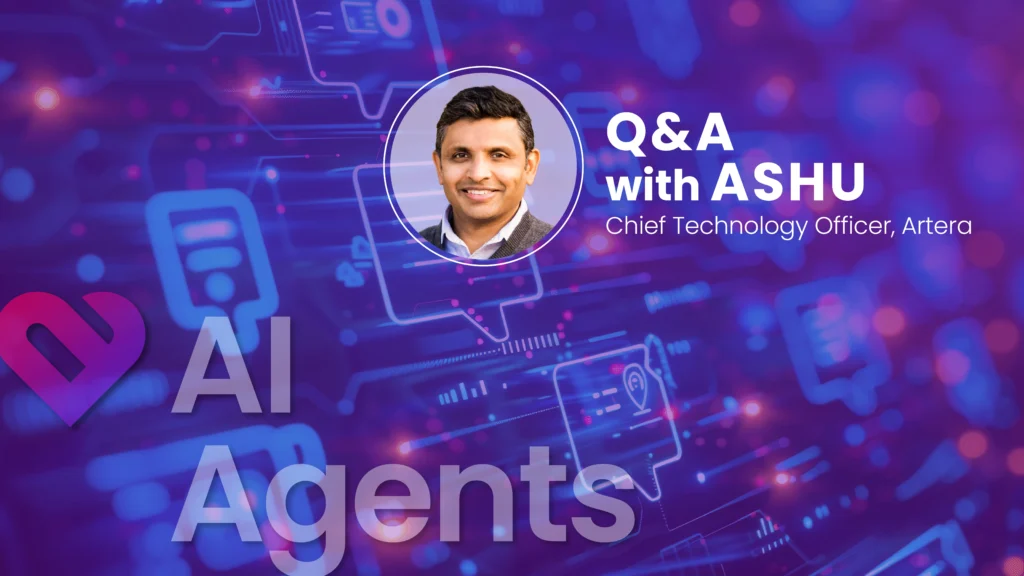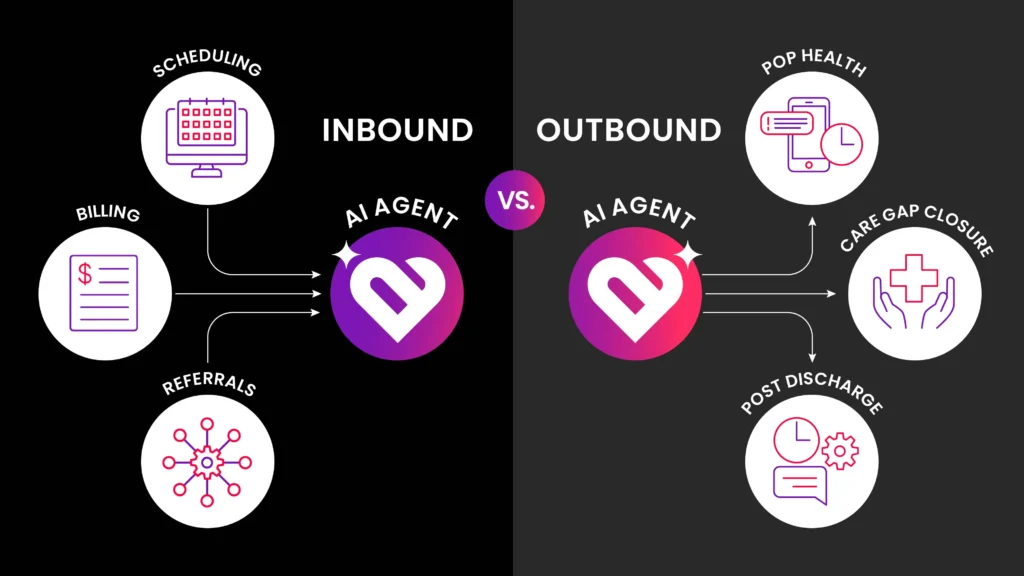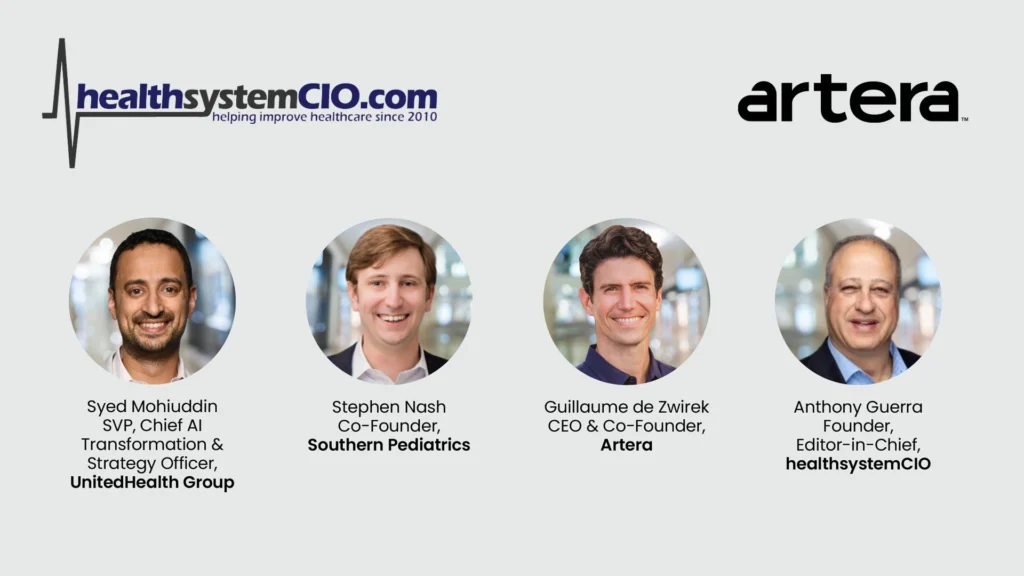Artificial intelligence (AI) – specifically agentic AI – is at the forefront of healthcare today, transforming the digital health landscape with countless companies now offering AI-powered virtual agents for healthcare. But not all solutions are created equal.
At Artera, we’re leveraging AI-powered virtual agents to redefine patient engagement and workflow optimization across health systems – blending our depth of healthcare expertise, a decade of experience and robust library of validated workflows. To explore the vision, strategy and technique behind our AI solutions, we sat down with our CTO Ashu Agte.
Here’s what he had to say about Artera’s strategy for building virtual agents.
Now is the Time for Agentic AI in Healthcare. Here’s Why.
Question: Why is now the right time to introduce Virtual Agents?
In a recent discussion with Artera CEO Guillaume de Zwirek, he outlined two key reasons why agentic AI in healthcare is taking off at the moment: first, the current hype around AI, which brings fear, uncertainty and doubt (FUD) of being left behind, and second, financial pressure and an economic need to address rising costs and labor shortages in a time when interest rates are high and increases in reimbursement pressures are forcing health systems to rethink resources. Artera CTO Ashu Agte believes another major factor is also contributing to the need: the introduction of “(LLM) Model as a Service (MaaS).”
Ashu Agte: At some point in the last six to nine months, the term “(LLM) Model as a Service” (MaaS) started becoming a commodity in the AI world, leading to a major inflection point. Essentially, with platforms like OpenAI and Anthropic, there is no need to build your own model – those solutions have made it possible to build on top of them, now called AI Engineering, enabling users to build AI-based products without extensive in-house expertise or infrastructure. This has created a lot of commodity and cost efficiencies, in addition to faster acceleration across the entire agentic space. Rather than building a model from scratch, we can scale our AI technology faster and more efficiently – this is why we decided now is the time to jump into this.
What Sets Artera’s AI-Powered Virtual Agents Apart?
Question: Tell us about what AI agents are at this company, and why they’re different from chatbots or simple automation tools. What is our strategy all about?
Ashu Agte: Not all AI is created equal. Many companies advertise AI solutions that are little more than advanced chatbots. What sets Artera’s virtual agents apart is our focus on going beyond basic conversations. There are three critical pillars to Artera’s AI strategy.
- Reasoning and Context: Our AI virtual agents don’t just respond to questions; they analyze context to understand intent and provide meaningful solutions, turning conversations into a multi-step dialogue. Our agents have the ability to interpret the intent and determine which actions to recommend based on information from our database.
- Autonomy and Action: Beyond providing information, Artera’s AI agents are capable of completing actions like scheduling appointments, processing cancellations or managing prescription renewals by using a variety of APIs. This isn’t about replacing human interaction but enhancing efficiency by handling repetitive administrative tasks autonomously.
- Workflow Focus: Our AI agents are designed to handle communication end-to-end across the entire patient journey, covering tasks such as patient outreach, eligibility checks, scheduling reminders and form submissions. We can have multiple of these use cases stitched together under one agent with just one user supervising.
Our Approach to Building Safe and Compliant AI Agents
Question: Can you talk about Artera’s approach to building agents and the underlying technology from a safety standpoint?
Ashu Agte: As I mentioned before, we are not building or training LLMs – for now, we are sticking with out-of-the-box LLMs from OpenAI, Anthropic, etc. (aka “MaaS”).
Our approach to building agents is designed to progressively enhance an agent’s capabilities and focus, outlined in a four-step framework:
- Foundational Agent: The first step is essentially the foundational agent, which would be very similar to ChatGPT. If you ask that agent any question, it would answer – it’s not healthcare-specific. It’s also not performing any actions or doing anything specific to Artera or healthcare-related items.
- Artera / Healthcare Agent: To add more purpose to the foundation, we would turn the agent into an Artera / healthcare agent, where we would provide it prompts and instructions to only have conversations about healthcare-related items, and refine from there.
- Use-Case Specific Agents: The third step is to take the Artera / healthcare agent and turn it into use-case-specific agents. When all the healthcare context is inherited, we would turn one agent into a scheduling agent, adding more instructions and integrating it with the Artera Harmony system so that it can take necessary actions by calling APIs.
- Customer-Specific Agents: The last step is to take that use-case specific agent to a customer, add knowledge base from them and customize the template to fit their brand and deploy them effectively. Adding the knowledge base step is achieved by using RAG (Retrieval-Augmented Generation)
These are essentially the four steps of evolution to provide a more customer-specific purpose. To create this purpose, there are techniques that are used to ensure accuracy:
- Prompt Context Instructions – use in all of the phases to make sure the agents work
- Adding the Knowledge Base – ask customers to provide knowledge and information in a structured format, for a use-case specific agent
- Fine-tuning – eventually (potentially 2-3 years in the future), when we have a significant amount of data, we could fine-tune the models into even stronger ones
The Artera Advantage – AI in Healthcare
Question: What would you say is Artera’s advantage in terms of building these type of virtual agents?
Ashu Agte: The future of virtual agents in healthcare is both inevitable and exciting. However, not all solutions will survive. To be successful, companies need at least one of three things: unique tech, unique data or a strong distribution network.
At Artera, we’ve already developed large-scale integrations with healthcare systems, giving us a distribution advantage. As I previously mentioned, the actions agents need to perform will rely on seamless integrations with EHRs and various other vendors within a health system. Thanks to our advanced automations and features, we’ve established strong connections with EHR systems and other vendors across our 900+ customers. By adding a layer of agents on top of this foundation, we can effectively leverage and maximize the potential of our existing technology. These existing API integrations give us the unique data advantage.
What does this mean? Artera has two of the three things required to be successful, which will reduce our barrier for entry into health systems.
Additionally, we are focused on maximizing value for our clients to ensure long-term success. The hype around AI might encourage quick purchases, but renewals will only happen if the technology consistently delivers results, whether by reducing costs, improving patient engagement or increasing operational efficiency. This is at the forefront of our minds when building.
From a compliance standpoint, our systems are meticulously designed to meet HIPAA compliance standards, including collaborations with trusted partners like AWS and Twilio (both of which are fully HIPAA compliant). To ensure the highest level of privacy, our knowledge base and prompt context instructions are built to neither process nor store any patient-specific data, such as PHI or PII.
These are the exact reasons why Artera is in a unique position to help enable AI agents at health systems across the nation.
Want to Learn More About Artera’s AI Agents?
In terms of AI, we’re only scratching the surface of what’s possible today. Above all, our focus is on providing value at every stage of the healthcare process, from appointment scheduling to post-visit follow-ups. We will continue to help solve for the key challenges health systems face every day with our AI-powered solutions.
Agentic AI in Healthcare: A Broader Industry Perspective
As Artera advances its virtual agent strategy, it’s important to understand the broader framework that defines agentic AI in healthcare. Agentic AI refers to intelligent systems capable of independently performing tasks, making decisions, and solving problems with minimal human oversight. These agents represent a significant leap forward in healthcare innovation—driving automation, personalization, and efficiency.
Key characteristics of agentic AI include:
- Autonomy & Decision-Making: Agents are designed to act independently using contextual cues and internal goals—reducing the need for constant supervision.
- Personalized Care: By analyzing individual health data and behavior, agentic AI helps tailor care plans and predict patient needs.
- End-to-End Automation: From patient intake to post-visit follow-ups, agents can handle administrative workflows, communication, and data entry.
- Remote Monitoring & Diagnostics: Integrated with IoT devices and EHRs, these agents support early intervention, smart alerts, and even assist in diagnosis.
The impact? Improved clinical outcomes, reduced operational costs, enhanced access for underserved populations, and less burnout for healthcare staff.
At Artera, our AI-powered virtual agents are engineered with these agentic principles in mind—augmented by 2B+ patient interactions, deep EHR integrations, and strict HIPAA compliance. We’re not just following the trend—we’re setting the standard for safe, scalable, and outcome-driven agentic AI in healthcare.
Interested in learning more? Discover how Artera’s virtual agents can elevate your organization and take patient engagement to the next level.



